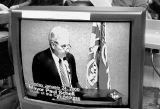ONLY THE MAYOR can declare a civil emergency, according to Seattle’s city charter.
But City Council member Peter Steinbrueck wants to enhance the ability of legislators to monitor, modify, or even terminate a mayor’s declaration of emergency. To this end, he has proposed a package of changes to the city’s civil emergency laws.
“The idea is to get some oversight and involvement on the part of the council, since ultimately we’re all held responsible for what happens during times of crisis,” says Steinbrueck. After Schell declared a civil emergency during the December 1999 World Trade Organization conference riots, Steinbrueck was concerned enough about the process that he convened a group of private attorneys to review the situation.
Specifically, Steinbrueck and some colleagues were concerned with delays in the council’s review of Schell’s emergency declaration. The council had intended to discuss the order the afternoon after Schell issued it, but the meeting was canceled by Council President Sue Donaldson, who cited concerns about the adequacy of security procedures in council chambers.
Now Steinbrueck is offering legislative proposals that would require that the council review a proclamation of civil emergency within 48 hours of issuance; authorize the council to terminate the emergency (currently, only the mayor has this power); and mandate that the mayor issue several written statements with the declaration of emergency, including a statement of the facts upon which the declaration is based.
Roger Nyhus, Mayor Paul Schell’s press secretary, says the mayor’s office received Steinbrueck’s proposals just last week. He says the mayor plans to review the package thoroughly and provide a written response.
Steinbrueck stresses that his intention isn’t to supplant the mayor’s authority or restrict the executive’s ability to act quickly and decisively in response to civil unrest or disaster. Nor, he adds, should his proposals be interpreted as any personal criticism of Schell’s actions during the WTO.
“It’s really to have a greater degree of accountability and sharing of information,” he says. “Regardless of who is giving the executive orders, it seems to me that nine council members ought to know what’s going on—and, if necessary, intervene.”
James Bush







